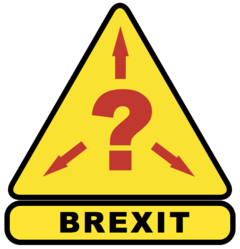
On June 23 voters in Great Britain chose to leave the European Union by a slim margin of barely 4%. Much has already been written about the conundrum this leaves the nation in, but perhaps it might be useful for economists like myself to make clear what sort of predictions about the economic consequences are credible, and which are not. Simply put, neither the optimistic scenarios advanced by the "leave" campaign are credible, nor are the overly pessimistic scenarios advanced by the "remain" campaign plausible.
Undoubtedly, Brexit will create uncertainty for investors, and this will have negative repercussions for Britain's economy, but overall macroeconomic considerations suggest that the fallout will be much more benign. Whatever Britain does, it cannot change geography. Continental Europe will remain Britain's main trading partner, and Britain will want to maintain access to this market for goods and services, including Europe's labour market. Britain needs Europe, and Europe needs Britain. However, which of the many different models of association Britain chooses to pursue only time will tell.
First, the economics. Paul Krugman has argued in his recent blog The Macroeconomics of Brexit that overly dire predictions of the consequences are not consistent with standard macroeconomic models. Most economists would agree with Krugman that giving up integration into the common market will come at a small cost, perhaps 2-3 percent of lower income in perpetuity, as he suggests. But a recession is highly unlikely. The drop in the British Pound helps stimulate exports, and this will counteract any short-term slowdown. Britain remains an important market in Europe, with our without E.U. membership. On the other hand, claims by the "leave" campaign that withdrawal from the E.U. would stimulate productivity and free Britain from over-regulation by Brussel bureaucrats are pure fiction. If Britain wants to continue selling goods to E.U. countries, it will have to abide by E.U. rules. Sadly, Britain will not have a voice at the table shaping these rules. This is sad for the E.U. because Britain has been a reliable champion of liberalized markets. Without Britain, British exporters may well find that European markets will not become easier to access, but more difficult. In the long run, much will depend on the model that Britain chooses to follow. Most likely and most desirable will be the Norwegian model: free access to the E.U. market in exchange for contributions to its budget, and accepting internal migration.
Second, the politics. The referendum offered a simple choice: remain or leave. But reality is complex, and what people voted for in the end was a mixed bag of different ideas. Anti-immigration sentiment played a significant role in the "leave" campaign, as did overblown caricatures of E.U. rules in some media outlets. Falsehoods abounded, such as the notion that Turkey was just about to join the European Union. The result of the referendum has been spectacularly divisive: the young, educated, and urban voters wanted to remain; the old, less-educated, and rural voters wanted to leave. Scotland and Northern Ireland were hugely in favour of staying, and England and Wales were highly in favour of leaving. The referendum has generated centrifugal forces in the United Kingdom that any new government will have trouble keeping in check. A new independence vote in Scotland is possible if the newly-negotiated association with the E.U. leaves Scottish voters dissatisfied.
The notion that leaving the European Union turns Great Britain back into an independent country is an illusion. Voters who believe this nostalgic sentiment were longing for a long bygone era when the Westphalian Principle ruled supreme: that a nation state has full sovereignty over its domestic affairs to the exclusion of all external influences from other countries. But the world has changed in the 20th century. Countries are interdependent and entangled in a web of mutual support and mutual obligations, through a plethora of international treaties and international law. The existence of transboundary effects such as international trade, migration, and international environmental and resource issues makes cooperation among countries a necessity. Whatever shortcomings the European Union has—and it has many—Britain's presence at the table finding solutions will be dearly missed. Germany's Angela Merkel reacted to the Brexit vote with her trademark calmness and wait-and-see approach. There is much to like in this attitude as Britain is figuring out what they really want to do now. Once they know, they can invoke Article 50 of the Lisbon Treaty, and then the negotiations start. However, negotiations before Article 50 has been invoked are premature. E.U. leaders are right to sit tight until Britain starts the two-year clock of negotiations.
Britain's divorce from the European Union may turn out to be less dramatic than many predict. Later remarriage is not impossible. (We still love you!) Perhaps voters may be called upon to vote again to approve or reject the association treaty that the new British government will have to negotiate with the E.U. Rejection of that deal would keep Britain in the E.U., after all. Acceptance will lead to a new form of association, but not "independence". Meanwhile, businesses should follow rule #1 of the troubleshooting manual: don't panic. And rule #2: the view is clearer once the dust settles.